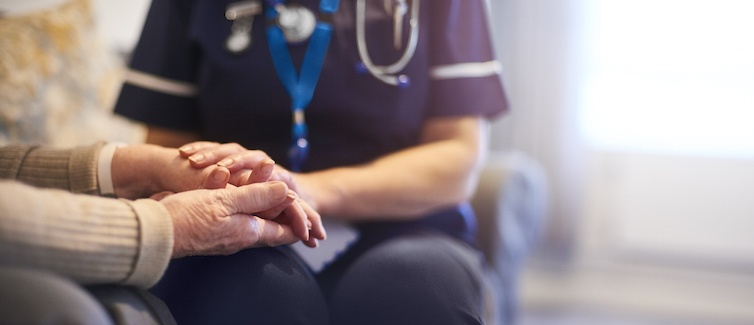Each cancer journey is as unique as the person walking it. The same can be said about how an individual approaches the end of their life. Still, there are things everyone can do to prepare.
Communicate Your Wishes For The Future
If you have end-stage cancer, be sure to have important conversations about your end-of-life preferences and plans as soon as possible. Put things in writing and communicate openly to ensure that everyone in your family is on the same page.
By taking care of these details as you’re nearing the end of your life, you can feel at peace knowing your wishes will be honored and loved ones will know how to make decisions on your behalf. You can also focus more on what and who you love instead of paperwork.
How to communicate end-of-life preferences
Several organizations offer resources for starting these difficult, but necessary conversations. They also provide tools that simplify the process of recording your preferences and priorities. Here are two of them:
- The Conversation Project: Get a free conversation-starter kit on the website, which includes ways to introduce tough topics with family and friends, and scales for rating what you as the patient value most. You’ll also find downloadable packets about how to choose a health care proxy.
- Five Wishes: This practical advance directive document is intentionally written in everyday language that’s easy to understand (no confusing medical and legal jargon). Additional resources are available on the site to ensure clear communication between patients, care providers, and the people they love.
Never Miss a Beat!
Subscribe to Our HealthBeat Newsletter!
Thank you for subscribing!
You can now select the specific newsletters you'd like to receive.
You are already subscribed.
Subscribe to more newsletters in our email preference center.
Sorry, an error occurred. Please try again later.
Get Healthy Tips Sent to Your Phone!
Access Available Resources
Surround yourself and your family with support in the bittersweet days ahead. You can find in-person or virtual support groups through organizations like the American Cancer Society. The National Cancer Institute also has a booklet on coping with advanced cancer. Ask your health care providers for advice about groups that might be best suited to your needs.
If you have hospice or palliative care, support for the whole family is generally included in those services. Take advantage of them. They can help you understand what to expect, both in terms of physical symptoms as you near the end of life and in terms of how you, your family, and your friends may react emotionally.
Some organizations provide or have connections to pet therapy, music therapy, or other means of comfort for those with end-stage cancer. Pursue these sources of joy and meaning to soften the difficult and emotional days ahead for you and your loved ones.
What to Expect Near The End of Life
Timing will vary for each person, of course. Different types of cancers and treatments will influence how the end of life unfolds. But it helps to have a general understanding of what signs and symptoms may signal the end.
At the end of life, you may notice:
- Changes in sleep patterns
- Decreased appetite and thirst
- Fewer bowel movements and a decreased need to urinate
- Increased pain levels
- Increased confusion
- Changes in heart rate, breathing, and blood pressure
- Changes in body temperature
- Changes in skin color and feel
Coping With The Last Phase of Your Life
Remember to prioritize your own health and well-being during your final days. Set boundaries to avoid becoming overwhelmed or burned out, and maximize quality time with your loved ones. Self-care is still important: a soothing cup of tea, a favorite movie or playlist, fresh flowers to brighten your room.
Establish routines for yourself, too — visiting hours similar to those at the hospital, an afternoon nap to recharge before or after visits, dinner at the same time every day — whatever works to give you a sense of comfort and security toward the end of your life.
Prepare for a Peaceful Transition
As you’re nearing the end of life, encourage your loved ones to create rituals that will help them honor your memory and find happiness as they grieve. If you or your family are unsure of what to do, hospice providers or support group friends who have experienced a similar loss may have creative suggestions or advice.
The National Cancer Institute offers a guide that is focused on coping skills for the family and friends who are left behind. Encourage your family and friends — especially your primary caregivers — to review these resources in preparation for their new normal after you’re gone.
Sources
"What to Expect When a Person With Cancer is Nearing Death." American Cancer Society. https://www.cancer.org/treatment/end-of-life-care/nearing-the-end-of-life/death.html
"Emotions and Coping as You Near the End of Life." American Cancer Society. https://www.cancer.org/treatment/end-of-life-care/nearing-the-end-of-life/emotions.html
"Survivorship." National Cancer Institute. https://www.cancer.gov/about-cancer/coping/survivorship
"End-of-Life Care for People Who Have Cancer." National Cancer Institute. https://www.cancer.gov/about-cancer/advanced-cancer/care-choices/care-fact-sheet
"Last Days of Life (PDQ®)–Patient Version." National Cancer Institute. https://www.cancer.gov/about-cancer/advanced-cancer/caregivers/planning/last-days-pdq
"Cancer Treatment at the End of Life." New York Times. https://www.nytimes.com/2019/08/05/well/live/cancer-treatment-at-the-end-of-life.html
About UPMC Hillman Cancer Center
When you are facing cancer, you need the best care possible. UPMC Hillman Cancer Center provides world-class cancer care, from diagnosis to treatment, to help you in your cancer battle. We are the only comprehensive cancer center in our region, as designated by the National Cancer Institute. We have more than 70 locations throughout Pennsylvania, Ohio, and New York, with more than 200 oncologists – making it easier for you to find world-class care close to home. Our internationally renowned research team is striving to find new advances in prevention, detection, and treatment. Most of all, we are here for you. Our patient-first approach aims to provide you and your loved ones the care and support you need. To find a provider near you, visit our website.
